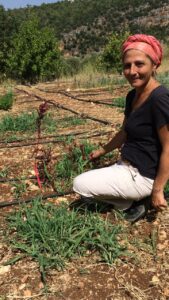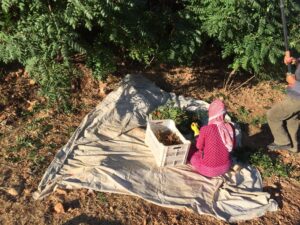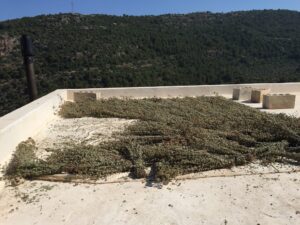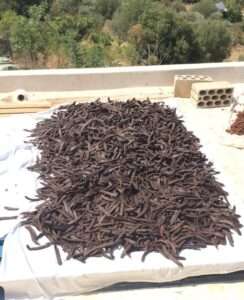bassatin baanoub
our new producer
We’d like to introduce you to our new producer, bassatin baanoub, who grow and make the aromatic za’atar mix and oregano we import.

Yasmina beside the amaranth plants she grows.
one of the oldest farms in Lebanon
Tucked away in a valley beside the Awali river, 60km from Beirut, there’s a small piece of paradise called bassatin baanoub. Yasmina Raffoul and Jean-Pierre Zahar rented the land from the neighbouring monastery in 2012. They have continued an ancient farming tradition which their ancestors some 2,300 years ago, might well recognise. Living off the grid, at the end of a track, the land is probably one of the oldest farms in Lebanon.

Rhus coriaira (sumac) being harvested – gloves must be worn because the berries are very astringent.
what do they grow?
Carob and olive trees, which have an ancient history in Lebanon, grow on their terraced land. Pomegranates, bitter oranges and sumac shrubs also enjoy the fertile red soil not far from the Mediterranean. Since a lot of their clients have left Lebanon, Yasmina and Jean-Pierre have had to diversify away from growing organic vegetables. Instead they grow aromatic plants and herbs like Origanum syriacum which can be harvested and dried. This herb is the central ingredient in the za’atar mix we import. Yasmina also makes a floral distillate from the oregano, flavours their bitter orange marmalade and uses it for infusions. All in all drying the herbs means less wastage than when they used to grow organic vegetables.

Origanum syriacum drying in the sun.
carob pods
From the pods of this ancient tree, they make dibs el kharoub – carob molasses, so popular in Lebanon. Its dark sweet, earthy taste is mixed with tahini, and eaten at the end of a meal with a biscuit or bread. Think peanut butter and jam, but more elegant. With a small team of workers, they also produce honey and floral waters. These have a big part to play in what makes up the Lebanese herbal medicine chest. Essential oils and floral waters from the distillation of herbs are mixed with beeswax and oil as useful herbal balms.
where does the name come from?
“Bassatin” means orchards in Arabic, and “baanoub” is the name of the settlement. While the origins of the farm are still unknown, each time they find a piece of pottery or a new plant, it’s a reminder of the land’s ancient history. One of Yasmina’s favourite plants is the Urignea maritima. It flowers at the end of summer announcing that the rains are on their way. Popular with bees, in Arabic it’s called the “rain stick”. The straighter it grows the more likely it is that the season will be wet. We hope that these hard working farmers are rewarded with a good rainy season this year.

